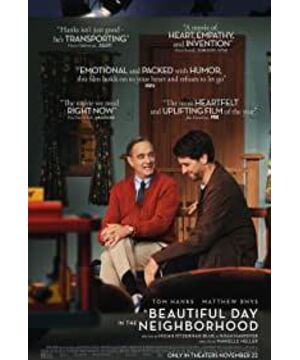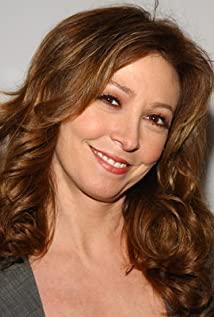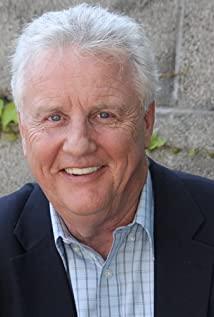I rarely go to the introduction when I watch a movie, so to be honest, I don’t think this is a chicken soup movie. Since there is no preset expectation value, the so-called chicken soup has no habitual resistance, so the emotions are completely affected. The actor's acting drove it in.
I think that even in chicken soup movies, I think the director’s handling is advanced. In form, it seems that Royd interviewed Rogers. In fact, it was Rodgers who relieved Royd’s mental illness. The plot and lens arrangements of the film are actually very concise. On the surface, Lloyd had no choice but to interview Rogers, but it was actually Rogers's intention: Lloyd's own public impression caused his embarrassment, and Rogers appointed him after knowing him. In fact, Rodgers had already seen some emotional problems in himself through his articles. And these messages are only conveyed in a few short conversations between Lloyd and the leader.
The director knows what his focus is, so naturally he will not take more shots to tell you more than this line of fullness or sitting emotion that convinces or satisfies you. This is the importance of the details of the movie, and you don’t pay attention. Details can easily be overshadowed by emotions invisibly. For example, the film footage of the material preparation before the wedding and the baby seat placed on the car already shows the emotional state of the couple and the natural state under the eight-year marriage. I don’t know why some viewers would complain. The emotional frailty of husband and wife...
The film did not present a sense of discomfort in trying to portray the image of a saint. Many of the lens arrangements were actually very objective, and even abandoned many sensational saint perspectives. It is precisely under such restrained objective shots that I admire Tom Hank more. Si's natural and skilful performance made me think that he is the good American man himself.
In addition, I feel that the director’s intention is instead to emphasize that “there is no saint in the world”, such as the scene from the scene at the end of the movie, and when Lloyd was interviewed at Rogers’s house for the first time, Lloyd was almost offensive. When talking about Rogers’ sense of saintness and his children in a speculative manner, Rogers was very calm and honest. After he admitted his relationship with the children, although he added one sentence, this is not the answer you want. Just answering in the direction that Lloyd wanted to know, it has nothing to do with the facts, but when the camera closes up Rogers’s face and some physical behaviors when he answers, he has already told the audience the answer, and then he also almost offensively asked Lloyd’s father. Of course, Lloyd can’t control it. Leave with their own emotions. Rogers himself once said that the way he controlled his emotions included playing the piano bass keys, and the conversation between Royd and Rogers’ wife knew and revealed that Rogers’ ways of controlling anger and emotions included swimming, reciting people’s names and praying, while Rogers swimming in the pool. Reading the names of the Walkers family, I think this also proves that he encountered Lloyd's emotional fluctuations-including anger, which is when the interview talked about his relationship with his children.
I don’t know why Rogers helped Lloyd in the movie so much to get rid of his heart knot. I guess he read Lloyd’s article and learned about his family relationship in other ways, and found that his relationship with his father was related to the relationship between him and his children when he was young. The similarity is the three years when the business was closed for three years to deal with the father-son relationship.
As a past person, he has learned to control his emotions in a way that does not hurt himself and others, so he wants to guide Lloyd to grow.
In fact, although the content of the article written by Lloyd is unknown, I know that he is no longer a recorder who can only judge right and wrong as a standard documentary. The reconciliation with his father’s feelings is also a reconciliation with himself. He began to infuse emotions, and The 4D characters in that article are naturally full of emotions, and instead of documenting cold words, they use warm sentences to describe moving.
In short, this is a good movie in my mind.
View more about A Beautiful Day in the Neighborhood reviews











